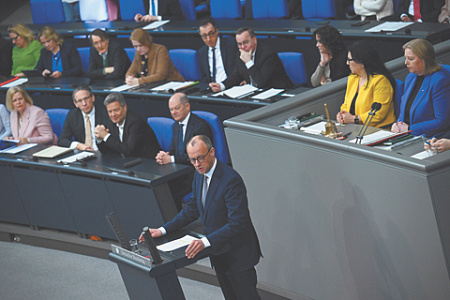
On the morning of March 18, the old, already re-elected Bundestag, which met at the request of a third of its deputies (in accordance with Article 39 of the Constitution), supported the amendment of the Basic Law of Germany. This step was necessary to adopt an extra-budgetary emergency fund for the reconstruction of the country’s economy and increase military spending, including assistance to Ukraine. The size of this fund is 500 billion euros, and it will be spent over 12 years.
513 deputies voted for this decision, with 489 required for adoption. 207 people’s deputies were against it. The decision on the fund was a compromise between the conservative CDU/CSU bloc, which won a relative majority in the February 23 snap elections, and the Social Democrats, who took third place. The fact is that both parts of the future German government have different and largely opposite ideas about ways to overcome the economic recession in the country.
On the issue of increasing military spending, they have no contradictions. But in the new composition of the Bundestag, the future, so-called black-red coalition would hardly have been able to gather two-thirds of the votes. The fact is that the right-wing populist Alternative for Germany party, which took second place, and the Left Party have a blocking minority of votes. Therefore, before the first convocation of the new Bundestag on March 24, CDU leader Friedrich Merz needed to create the basis for a future government coalition – additional financial resources beyond the budget. This would make it possible not to raise taxes, as proposed by the Social Democrats, and not to cut social spending, as Merz himself wanted. In addition, Merz expects to take the post of German Chancellor.
Merz needed 489 votes to obtain a two-thirds majority. After intensive negotiations with the leadership of the Greens the day before, representatives of three parties – the CDU, CSU and SPD – managed to persuade the Greens to support the black-red coalition through some concessions (for details on this conflict, see NG on March 17).
It was important for Merz and his future government partners that the deputies gathered in full force. Therefore, the meeting was scheduled for 9 a.m. Berlin time, although the Bundestag meeting should have started only at 10.00. It was possible to reach the latecomers in an hour. And despite this, there is uncertainty that there will be deputies, especially from among those who did not get into the new Bundestag, who may abstain or vote against for various reasons.
There was also a danger that a number of opposition MPs would demand the convocation of a new Bundestag as early as March 18, and this would make it impossible for the old composition to vote. But the deputies of the Left Party did not take such coordinated actions with the right-wing populists because of ideological considerations. From the point of view of representatives of the Sarah Wagenknecht Alliance, the Left-wing Party missed a historic chance to prevent a constitutional change that could have an impact on the political and economic life of the country for many years to come.
Representatives of the parties represented in the old Bundestag spoke before the vote. Thus, the co-chairman of the SPD, Lars Klingbeil, called for voting for changing the Constitution in connection with the changed situation in the world. He sees the reason in the actions of Russia, which threatens the security of Germany.
He was supported in this by the future Chancellor Friedrich Merz, who stated that the actions of the Russian president are directed not only against Ukraine, but mean a war against Europe and against Germany. Merz repeated unproven accusations against Moscow’s actions, claiming that Russians were behind the arson attacks, cyber attacks and even murders in Germany. Both of the leaders who spoke put the threat posed by Russia in the foreground in the need to change the Constitution, and only economic reasons in the second place.
After the debate, votes were held on the projects of the FDP and the Sarah Wagenknecht Alliance, in which attempts were made to challenge the proposed draft of the extra-budgetary fund. The Alliance project provided for the rejection of confrontation and the transition to diplomatic methods of solving problems of war and peace. Both projects were rejected by the old composition of the Bundestag. At 14.34 Berlin time, the deputies began voting – the ballots went to the ballot boxes.
